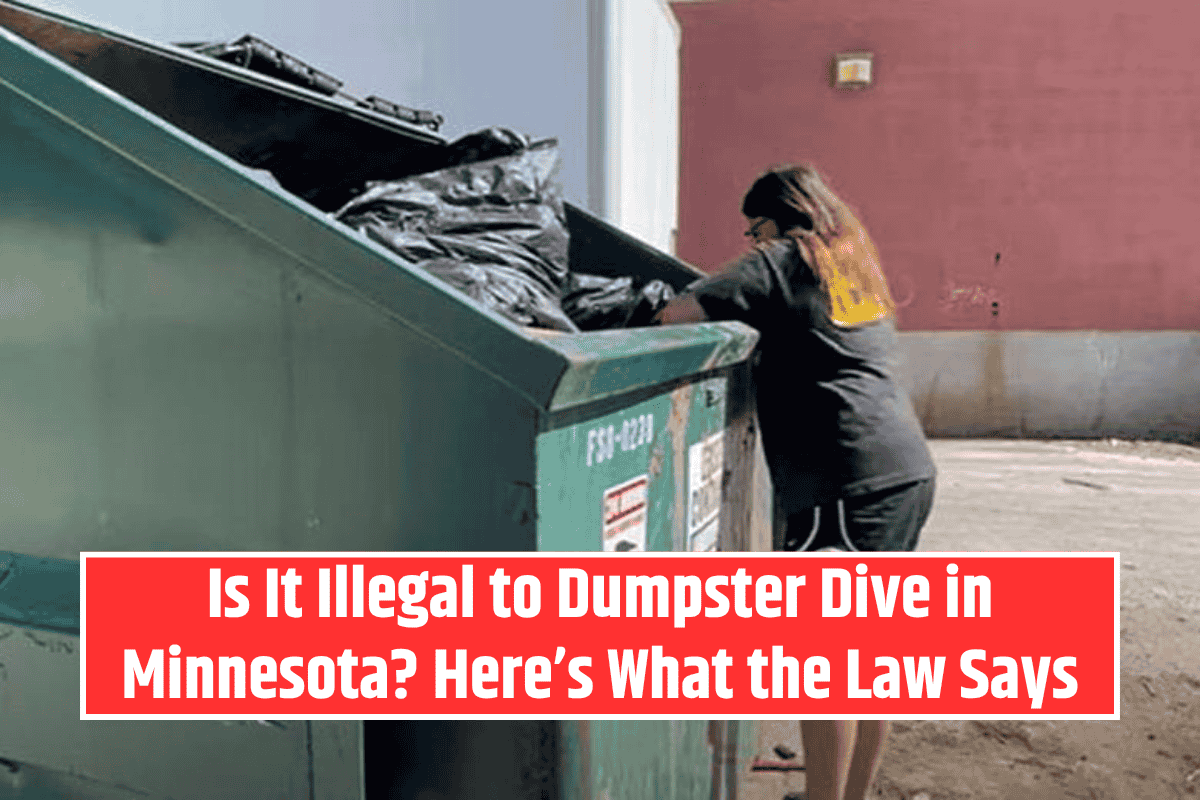Dumpster diving, the act of searching through commercial or residential trash for discarded items that are still usable, has gained popularity in recent years. Many people dive for treasures, non-perishable food, or resellable goods, often sharing their finds on social media.
But what about the legal aspects, especially in Minnesota? If you’re considering diving into a dumpster in this state, it’s important to understand the laws and risks involved.
Is Dumpster Diving Illegal in Minnesota?
Technically speaking, dumpster diving itself is not illegal in Minnesota. There are no state laws that outright ban looking through trash. However, while it may not be illegal in every case, there are other legal factors to consider that could turn an innocent dive into a legal headache.
The Problem with Private Property
One of the biggest legal risks of dumpster diving in Minnesota is trespassing. While it’s not illegal to search through public trash bins, you can run into serious trouble if you dive on private property. Here’s why:
- Trespassing: If you’re searching through a dumpster that is located on private property—like behind a store, near a mall, or in a residential area—you may be committing trespassing by entering that space without permission.
- Theft: Even though the items in a dumpster are being thrown out, they may still belong to the property owner until they are officially collected. Taking items from a private dumpster could be considered theft.
So, even if you’re just grabbing a few old items, such as candles or a broken picture frame, you could face legal consequences if you’re on private property without permission.
What About Businesses Like Malls or Grocery Stores?
If you’re thinking about dumpster diving behind a business, such as a mall, grocery store, or restaurant, be extra cautious. There are a few important things to keep in mind:
- No Trespassing Signs: If there are any “No Trespassing” signs posted near the dumpster, do not enter. These signs are clear warnings that you should stay away.
- Gated or Fenced Areas: If the dumpster is in a fenced or gated area, it’s likely private property, and you should stay out.
- City Ordinances: Even without visible signage, some cities or towns have local ordinances that prohibit dumpster diving. Local police may also enforce trespassing rules, so you may be charged with trespassing or theft.
Just because a dumpster looks easily accessible doesn’t mean it’s legal to dive into it. Always pay attention to your surroundings and the signs around you.
Where Are the Best Places to Dumpster Dive?
If you’re set on dumpster diving, there are certain places that are generally safer and more likely to be legal. According to ecofriendlyfact.com, here are a few locations where dumpster diving is often more accepted:
- Retail Stores: Many retail stores dispose of goods that are still usable, such as damaged products or excess stock.
- Cosmetic Stores: Sometimes cosmetic stores throw out items that are unsellable but still in good condition.
- Grocery Stores: For non-perishable items (never take expired or unsafe food), grocery stores are a common spot for divers.
- Construction Sites: While it can be a good place to find materials, always ask for permission and avoid active work zones.
- Video or Game Stores: These stores often dispose of old or returned games and accessories that can still be used.
At each of these locations, different rules may apply. Always be sure to check for signage and avoid closed-off or restricted areas.
Best Practices for Dumpster Diving
If you’re planning to dumpster dive, it’s important to follow some basic best practices to avoid trouble:
- Don’t Make a Mess: Always leave the area as you found it. Businesses may be more tolerant of divers who keep things tidy, but making a mess will likely lead to complaints and could cause problems for future divers.
- Go During Quiet Hours: Early mornings or late at night are ideal times to dive, as this is when trash is typically taken out, and there’s less risk of attracting attention.
- Be Polite and Respectful: If a business owner, police officer, or security guard approaches you, always remain calm and respectful. Being confrontational will only escalate the situation.
- Don’t Damage Property: It’s illegal to break locks, cut fences, or force open lids. Damaging property could lead to arrest or fines.
While dumpster diving in Minnesota is not outright illegal, the risks of trespassing and theft are real when you are on private property. Local ordinances may vary from city to city, so enforcement can differ depending on where you are.
Always be aware of your surroundings, avoid diving in restricted areas, and follow best practices to stay on the right side of the law. By doing so, you can enjoy dumpster diving safely and responsibly.












